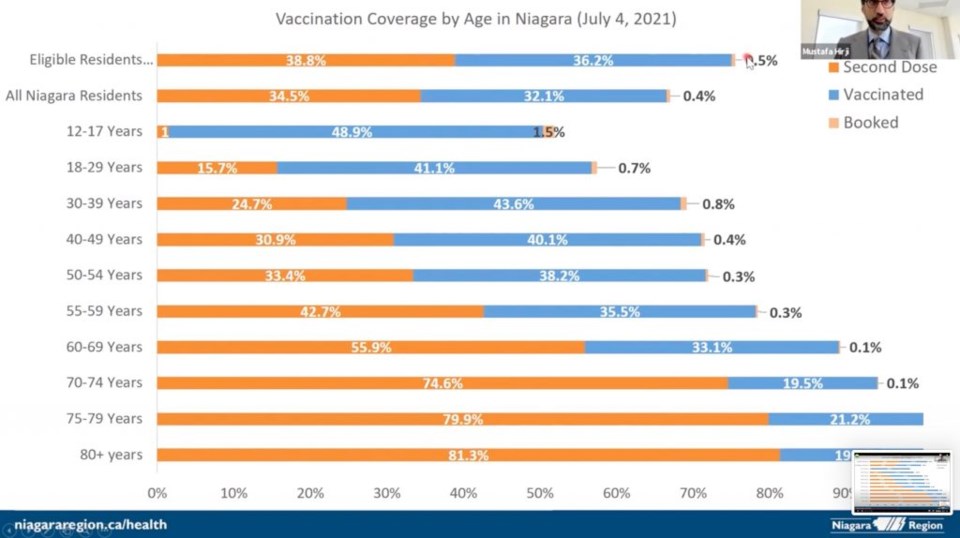
The downward trend of COVID-19 cases across the province is good news, says Niagara’s acting chief medical officer of health.
But Dr. Mustafa Hirji says he’s less optimistic about what he sees in Niagara, although the spread of the virus is slowing here as well — just not as quickly as he’d like it to.
The number of cases of the Delta variant is the cause of the increase. According to Monday’s numbers, it is thought to be responsible for 62.5 of the new cases reported in the last 14 days, but Hirji is estimating it to be less than that — the lag in screening time for that particular variant makes it difficult to pin down.
Delta variant cases remain a concern, because it spreads more quickly, and causes more hospitalizations, said Hirji.
There were eight new cases in total reported in Niagara Monday, with three active cases in Niagara-on-the-Lake.
Hospitalizations are decreasing, with only one person in intensive care due to COVID, Hirji said.
The all-important reproductive number is hovering around 1.0, he added, but is likely higher for the Delta variant, and lower for other strains of the virus.
If it wasn’t for the Delta variant, Hirji said, it would already be safe to reopen without worrying about straining hospital resources.
And while the vaccines work against it, “we still need two doses for it to be really effective.”
And that is more good news — the number of people in Niagara with their second vaccination is rising quickly, he said, especially among the older age groups, and overall, we’ve passed the point where more people have had their second dose than those with just one dose.
At the beginning of the week, about 75.5 per cent of those who are eligible have been vaccinated, said Hirji. If we can get over 80 per cent of those eligible fully vaccinated, “we’ll be able to reopen without overwhelming our hospital resources.”
But he warned that although more social contact is permitted, if we increase our social activity too much, we could see the trajectory of cases begin to rise again.
There are 30,000 to 35,000 people in Niagara who still need to be vaccinated, he said, most of them in the younger age groups. He stressed the importance of convincing young people to be vaccinated, to avoid a fourth wave and get to the point where everything can be open safely.
The majority of new cases are among the 20 to 39 age group, and they are the ones who need to be vaccinated to reduce the spread of the virus.
It’s too early to say if the lifting of Section 22 dining restrictions have had an effect on virus spread, Hirji says, but he’s not seeing that yet.
What he is seeing are outbreaks coming from indoor social gatherings, people visiting with family and friends, and then spreading the virus to other family and friends. “Personal gatherings seem to be at the centre of allowing the spread right now.”
For some reason, the younger people spreading the virus are the ones choosing not to be vaccinated. Getting them vaccinated will drive down cases, prevent another wave and allow reopening to continue, Hirji said.
Although it may be partly impatience when booking appointments, having to wait a couple of weeks rather than getting one immediately, there may be other causes for their vaccine hesitancy, and that is something the region is going to have a look at.
Doing more to understand why young people are choosing not to roll up their sleeves, and finding a way to convince them to get their shots, will be a priority for the region’s COVID-19 task force, he said.
In response to discussions about opening the U.S./Canada border, Hirji urges caution. There are a rising number of Delta variant cases in most states, and opening the border invites the virus to cross the border as well, he said. “We’ve made a lot of sacrifices over the last few months, with another lockdown and slow reopening. Reopening the border might mean losing all we’ve gained.”
The border will open in the next few months, he
suggested, “but we shouldn’t rush to do it, not in the next few weeks, when a few months will mean we can do it in a way that’s safe and sustainable.”